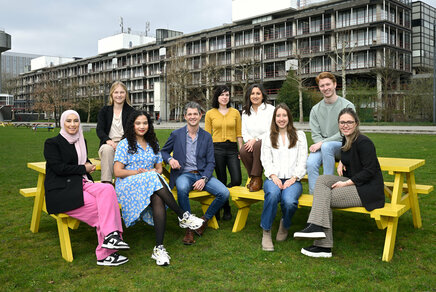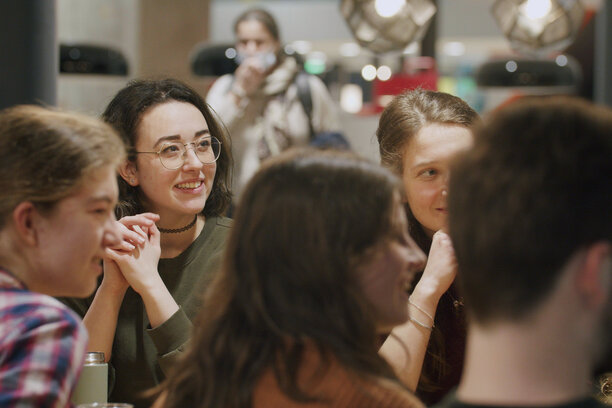‘We help other students find help’
Students helping students find help. That is what it is all about for the 24 student confidential contact persons, who are always ready to listen to anything concerning TU/e’s students’ well-being.
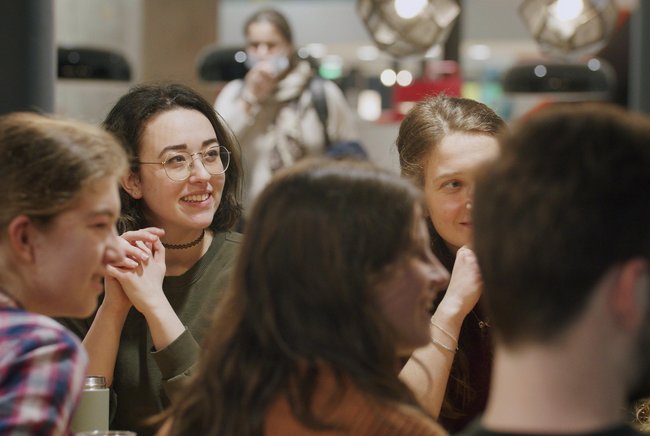
Hey students, what’s on your mind? Are you feeling out of sorts or need a sympathetic ear? Or do you have a problem you cannot seem to solve? You do not have to carry that burden alone; you can ask for help from a student confidential contact person (CCP). No fewer than 24 students from our university are standing at the ready to help you. They are trained as student confidential contact persons and will assist you in finding the right solution for your problem.
Dorina Bór is one of the 24 confidential contact persons (CCP) at our university. The second-year Human-Technology Interaction master’s student is a board member of the Footloose Student Dance Association. She is already a confidential advisor for that association. Dorina has no qualms fulfilling that role more broadly as CCP for all TU/e students.
“I arrived at the university, as an international student, in the middle of the global pandemic. It can be very intimidating to study in another country. My schedule was empty, and I felt lonely and disconnected from everything and everyone. I now know that feeling doesn’t last. Your schedule naturally fills up at some point, and you get to know more and more people. It gets better. It would’ve been great if someone had told me that at the time.”
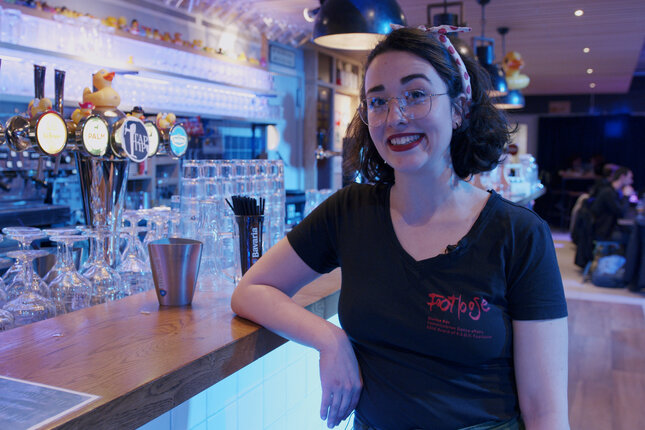
Listening without judgement
Dorina’s training for one-on-one contact with other students gave her the right tools to help other students. She learned to, especially, listen without passing judgment or filling in anything. “It helps me assess a situation better, to see whether professional help is needed. Can I help, or should I refer the person to one of the helplines we have at the university?”
These helplines connect students with general confidential advisors, academic advisors, psychologists, student advisors, and confidential advisors for scientific integrity. However, students do not always know how to find them. Or they struggle to admit that they need help from someone outside their sphere, says Student Diversity Officer Lara Hofstra. “It can be very scary to ask for help. It means admitting you’re not coping. You can lower that threshold for students by letting them talk to other students, their peers, first.”
It can be very scary to ask for help. It means admitting you’re not coping.
Student Diversity Officer Lara Hofstra
Lara points out that students that are CCPs are not confidential advisors: “They’re trained to be good listeners, not problem solvers. They can, however, direct students toward a solution. They tell the students who to turn to if they have an issue they cannot solve themselves. Sometimes offering that sympathetic ear is enough. For example, if someone is nervous about going to a confidential advisor, the CCPs can offer to accompany them as moral support.”
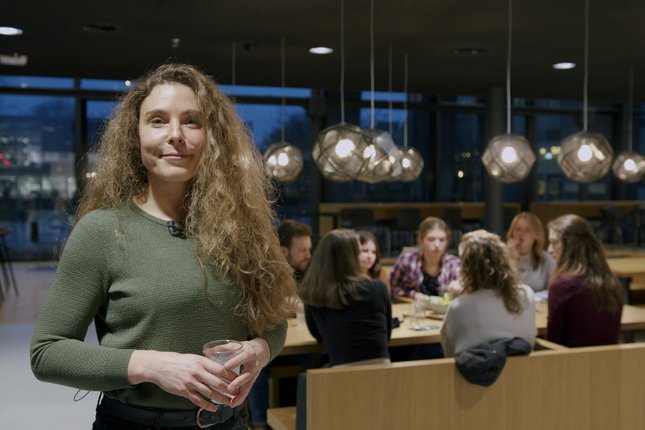
From students
Setting up the CCPs originated from students themselves. “But the university supports it,” says Lara. “For instance, the university’s student advance funds cover the start-up costs and training for the 24 CCPs.”
The CCPs come from the many TU/e student associations. Lara: “They support students when it comes to their well-being.” Together, the CCPs represent all five umbrella associations: ESSF (sports), Scala (culture), Compositum (social associations), FSE (study associations), and FISO (independent associations such as Cosmos, Lighthouse, Credo, and AEGEE).
“That’s resulted in a group of students that is as diverse as possible, right in the middle of student life. And there’s enough choice for everyone to find someone who’ll listen. You don’t have to use your association or umbrella association’s CCP; you can choose who you want.”
Demos
The student confidential contact person’s initiative has its origins in the Demos student association. In that association, more experienced students have been acting as contact persons for the younger students for years. Jan-Willem Melchers, a fifth-year architecture student, was a Demos board member last year and got talking to Student Diversity Officer Lara Hofstra about student well-being.
“At Demos, we pick up on many student issues, thanks to these contact points. But not all associations have those,” says Jan-Willem. “Why not ensure this is rolled out more broadly to other associations?”
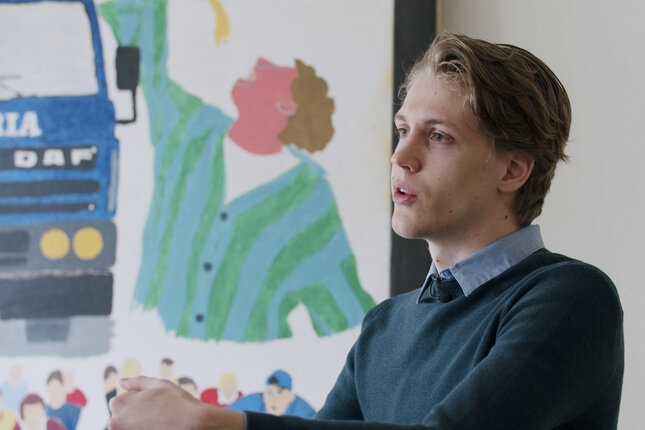
That got the ball rolling. Discussions with TU/e confidential advisors about clarity about how the roles would be divided, followed. “Confidential advisors often only come into the picture when people really get stuck. To prevent things from getting that far, talking to a CCP at an earlier stage could help. In those conversations, the emphasis is on helping you find the right assistance.”
There are plenty of places to find help at TU/e. But students don't always know who to approach.
Jan-Willem Melchers, initiator CCP's
“There are plenty of places to find help at TU/e. But students don’t always know who to approach. For example, academic issues can cause mental problems and vice versa. But an academic advisor can’t help with the mental part, and the student psychologist can’t help with your studies. So, where should you turn? That’s exactly where we as CCPs help other students find the right path,” says Jan-Willem.
The 24 CCPs have undergone training for the task. “You have to pay attention to what’s important to the person coming to you, not steer them in the direction you think is a good step. Listening well is an art.”
For who?
When should you reach out to a CCP? “If you are experiencing academic stress or personal problems, like getting into arguments with your parents or friends, if someone close to you is ill or has passed away, any insecurities. Even about unsafe social situations or addiction. Basically, anything where you could say, ‘I need someone to talk to about this’,” says Jan-Willem. Lara adds: “You can also go to these students if you see that someone else is struggling. The CCPs can then advise you on who you can refer that person to.”
Jan-Willem: “If you’re not sure if something is important enough to share, it is. Please feel free to get in touch with one of the CCPs!”
All the CCPs at a glance
Do you want to know which student confidential contact person you can talk to? At educationguide.tue.nl/ccp you can find all 24 CCPs and can choose with whom you would like to make an appointment.
More on our strategy

![[Translate to English:] [Translate to English:]](https://assets.w3.tue.nl/w/fileadmin/_processed_/c/f/csm_BvOF_2024_0319_AEV_license_TUe_Dirk_van_Meer_-_CORE_1__c976e259a5.jpg)
